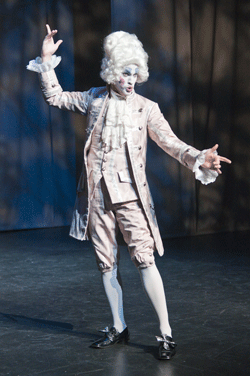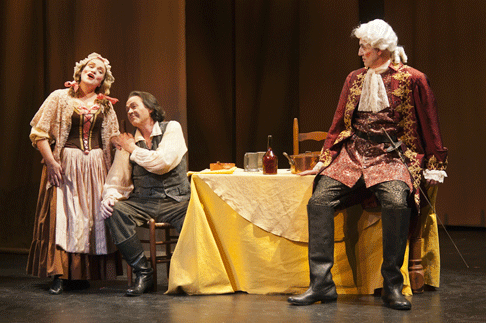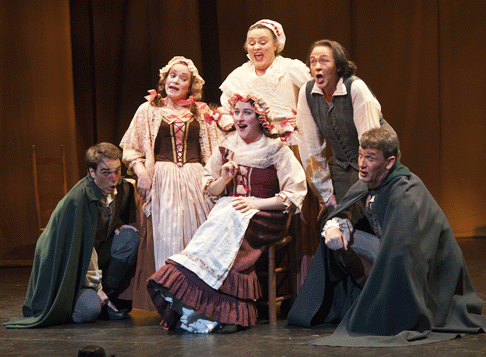OpÈra-comique began its
long and significant existence as a sort of French opera buffa, with less
grandeur in the musical requirements and spoken dialogue instead of sung
recitative between numbers. Over the years this mixed genre evolved in many
interesting ways, not always comical: Carmen began life as an
opÈra-comique.
 Jeffrey Thompson as Lurewel
Jeffrey Thompson as Lurewel
Le Magnifique had pretty tunes but the presentation was undermined
by two insurmountable problems: English plot summaries spoken between musical
selections (instead of the original French dialogue) and a title character who
never appeared on stage—horses don’t sing much in opera, even
opÈra-comique. Le Magnifique proved a great disappointment
considering the company’s excellent track record without horses,
but how do you solve the dialogue problem if the piece is not in the local
language and you are unwilling to trust your singers as actors?
The company’s music director, Ryan Brown, evidently has a passion for
the once-chic Monsigny, however, and this year (its 250th anniversary) he chose
to give the composer’s 1762 opus, Le Roi et le Fermier. This
piece has a simpler plot, drawn from an English play, and both title characters
(king and farmer) appear on stage and even sing. Furthermore, Le Roi
had legendary legs: A hit not only in Paris but in Vienna and St. Petersburg,
Le Roi et le Fermier was revived in 1780 at the theater at the chateau
of Versailles in a production designed for, and starring, Marie Antoinette, who
sang the role of the put-upon Jenny, a virtuous farm girl besieged by a nasty
milord. The queen’s brother-in-law, the future King Charles X, sang the
not inappropriate role of a dim but valiant gamekeeper. The show was often
given for a few years, before an audience as select as the cast to be sure,
and—miracle of miracles!—the sets have survived, have been
refurbished, and will be in use again later this winter—for Opera
Lafayette’s French debut. So New York’s Rose Theater at Columbus
Circle became, in effect, the site of the out-of-town try-out (without
sets).
 Dominique Labelle as Jenny, William Sharp as Richard and Thomas Michael Allen as Le Roi
Dominique Labelle as Jenny, William Sharp as Richard and Thomas Michael Allen as Le Roi
The plot is brief, basic, obvious, wry: The king (incognito) is lost in
Sherwood Forest in a storm. A kindly farmer invites him to dinner. The king
thus encounters honest subjects first hand, learning that the farmer’s
fiancÈe’s dowry (a flock of sheep) has been stolen by the lustful milord.
Meanwhile, the milord (his name is Lurewel, which must have been funnier in the
original English), also lost in the woods, has been discovered by gamekeepers
who think he’s a poacher. Brought to book, he recognizes the king, who
then punishes him and ennobles the farmer—who rejects the title for the
false tinsel it is. Kings reaching over the heads of the nobility to befriend
ordinary folk was a theme very much in the air, though Louis XVI seems to have
missed the point. Too bad; he’d have been good at it.
All this may seem artificial (is the average Western much better? The
Good, the Bad and the Royal?), and Opera Lafayette rolled with it:
Welcome, total artifice, so long as it is done with style. Didier
Rousselet’s witty staging in projected sets (a wonderful dark forest)
included silent movie bustle, mugging and mime, foolish
costumes—it’s dark in that hut but would a king remain incognito in
a jeweled silk waistcoat?—and a pair of intrusive but chic French
narrators to speak the dialogue between the musical numbers, standing behind or
beside the close-mouthed singers. One got used to this; it seemed part and
parcel of the artifice.
The score is tuneful and rewardingly clever with very simple means: A duet
for loutish baritone gamekeepers is followed by another for two foolish tenor
fops, and then, since they are all lost in the same wood, have a quartet,
devised by repeating the duets simultaneously! The three women in the cottage
with their separate concerns (worried bride, puzzled mother, chattering child)
become a lovely trio of contrasting vocal lines over a common melody in the
orchestra. Simple ideas, these, but effective and, in the voices of an
accomplished cast, delicious. Monsigny’s orchestration is lively and
witty (a pre-Rossini storm, galloping horns for the king’s hunt, tinkling
bells whenever money is mentioned), but his music is really not strong enough
to carry the occasion on its own. The original run had singing actors not
acting singers. Le Roi was probably known to—and
inspired—Gluck, Mozart, Paisiello, even Beethoven and Rossini, but they
each outdid their model. But it passed a charming evening, displaying another
piece of the puzzle of how composers learned to use musical forms to dramatic
effect, and how this blossomed into later, more elaborate opera. Marie
Antoinette had her faults, but no one denies she had taste.
 Scene from Le Roi et le Fermier
Scene from Le Roi et le Fermier
The Opera Lafayette cast sang French so well one was puzzled anew at their
not being trusted to speak the dialogue as well. But many of these singers, who
have impressed me on other occasions, in other halls, in far more difficult
music (Handel, for example) seemed to lack bottoms to their voices in the Rose
Theater. Does the hall cut off the lower notes (I sat in Row H) or were they
not fully in command of their parts yet? Or did they underestimate the task
required of them? Monsigny does not call for grand opera accomplishments and
the ranges are smaller than Rameau or Gluck would demand, but miscalculation
was in the air.
Dominique Labelle, in Marie Antoinette’s role of Jenny the
shepherdess, was a case in point. Stunning as Handel’s Angelica in last
summer’s Mostly Mozart Orlando, she had little use on this
occasion for high notes or ornamentation, and her upper register was
lovely—but low notes faded out. Her farmer, baritone William Sharp, was a
suitable match for he suffered from the same defect: good phrasing, forthright
mime, and a lower register that faded like woodland fog. They warmed up, but we
did not warm to them.
The opera’s vocal bravado was given, as politics and tradition
demanded, to its rankiest character, the King, tenor Thomas Michael Allen,
obliged to sing of the glories of heroic battle because this is a fairy tale
and the king must be brave as well as magnanimous. He did not have the serious
grandeur, the glitter in alt that one might have hoped for in a monarch, and
like the farmer hosts who insist that he sing for his supper, we were obliged
to be indulgent.
Smaller roles were more happily filled. Yulia Van Doren, in stiff pigtails
to symbolize her character’s age (fourteen), sang her little
chanson deliciously (she’s kissed the king and been slapped by
her mother) and made a convincing mime of childishness. Delores Ziegler held
down the mother’s contralto lines well in the exquisite trio. The noble
nitwits (who wears court wigs and satin in the woods?) were Jeffrey Thompson
and Tony BouttÈ; the bluff and foolish deputies who arrest them (Charles
X’s part) were Thomas DoliÈ and Jeffrey Newman, singing with great
sturdiness. The Opera Lafayette orchestra was small but effective, making all
Montigny’s delicate points with grace and Gallic lightness.
John Yohalem
image=http://www.operatoday.com/Le-Roi-8221.gif
image_description=William Sharp as Richard and Thomas DoliÈ as Rustaut [Photo by Louis Forget courtesy of Opera Lafayette]
product=yes
product_title=Pierre-Alexandre Monsigny: Le Roi et le Fermier
product_by=Jenny: Dominique Labelle; Betsy: Yulia Van Doren; La MËre: Delores Ziegler; Le Roi: Thomas Michael Allen; Lurewel: Jeffrey Thompson; Richard: William Sharp; Rustaut: Thomas DoliÈ; Charlot: David Newman. Opera Lafayette, conducted by Ryan Brown, at the Rose Theater. Performance of January 26.
product_id=Above: William Sharp as Richard and Thomas DoliÈ as Rustaut
Photos by Louis Forget courtesy of Opera Lafayette